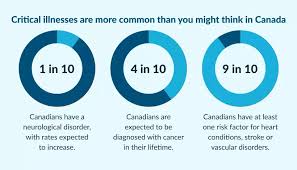Critical illness insurance is designed to provide financial protection if you are diagnosed with a life-threatening condition such as cancer, heart attack, or stroke. While it may seem like an extra expense, this type of coverage can offer peace of mind and financial security during a difficult time. But is it worth the cost? In this article, we will explore the benefits, drawbacks, and factors to consider when deciding whether critical illness insurance is the right choice for you.
What Is Critical Illness Insurance?
Critical illness insurance provides a lump-sum payment if you are diagnosed with a serious illness covered under the policy. The types of illnesses typically covered include:
- Cancer
- Heart attack
- Stroke
- Organ failure
- Kidney failure
- Multiple sclerosis
- Coronary artery bypass surgery
This lump sum can be used to cover medical expenses, replace lost income, or pay for treatments that may not be covered by standard health insurance.
How Does Critical Illness Insurance Work?
Critical illness insurance works by paying out a lump sum upon diagnosis of a covered illness. Unlike traditional health insurance, which may cover ongoing medical bills and treatments, critical illness insurance provides cash that can be used for any purpose.
Key Features of Critical Illness Insurance:
- Cash Payout: The payout is typically tax-free and can be used for medical or non-medical expenses.
- Coverage Scope: Policies vary in terms of the conditions covered. It’s important to check which illnesses are included.
- No Restrictions on Use: The money can be used however you see fit, such as paying for treatment, mortgage payments, or travel expenses for specialized care.
- Renewability: Some policies may not be renewable or may become more expensive as you age.
Pros of Critical Illness Insurance
1. Financial Security During a Critical Health Crisis
- If you’re diagnosed with a serious illness, critical illness insurance can help cover costs that health insurance may not. For example, it can be used to pay for experimental treatments, travel to specialists, or home care.
- Many people face significant financial burdens when dealing with a major health issue. Critical illness insurance can provide a cushion that alleviates the financial strain, allowing you to focus on recovery rather than worrying about money.
2. Income Replacement
- If you are unable to work due to a critical illness, the lump sum from critical illness insurance can replace lost wages. This is particularly helpful for self-employed individuals or those without paid sick leave.
- The payout can also cover ongoing living expenses, reducing the pressure on you and your family.
3. No Restrictions on How the Money is Spent
- Unlike health insurance that is specifically for medical expenses, critical illness insurance offers flexibility in how the funds are used. This means you can use the payout for anything, from paying for your home mortgage to covering daily living expenses, or even for alternative treatments.
4. Peace of Mind
- Knowing that you have financial coverage in place can provide peace of mind. Critical illness insurance gives policyholders confidence that they can focus on their recovery rather than worry about their financial future.
Cons of Critical Illness Insurance
1. Cost of the Premiums
- The primary disadvantage of critical illness insurance is the cost of premiums. These can be expensive, particularly for older individuals or those with pre-existing conditions. The cost also increases with age, and premiums may rise significantly over time.
- The premiums may be difficult to justify, especially if you’re in good health and feel you may never need to make a claim.
2. Limited Coverage
- Not all critical illnesses are covered under every policy. Some policies may exclude certain conditions, such as early-stage cancer, or only offer partial payouts for specific illnesses. Always check the fine print before purchasing.
- Additionally, some policies may have a waiting period, which means you must wait a certain amount of time before being eligible for a payout.
3. Health Insurance May Already Cover Some Expenses
- If you have comprehensive health insurance, it may already cover the medical expenses associated with critical illnesses. In some cases, you might not need extra coverage, especially if you have access to good health care and emergency funds.
- If your health insurance is sufficient, the cost of critical illness insurance may not be worth it, and you may be paying for coverage you don’t need.
4. Waiting Period and Exclusions
- Many policies have a waiting period before you can file a claim, which can range from 30 to 90 days. This means you could be paying premiums for months without being able to use the policy if you become ill.
- Exclusions for pre-existing conditions can also limit coverage, meaning if you already have a health issue like hypertension or diabetes, you may not be covered for related illnesses.
Who Should Consider Critical Illness Insurance?
1. People with Limited Health Insurance
- If you have health insurance but it doesn’t offer adequate coverage for critical illnesses or if you have high out-of-pocket expenses (such as deductibles, co-pays, and co-insurance), critical illness insurance can help fill in the gaps.
2. Families with Dependents
- If you are the primary breadwinner in a family, critical illness insurance can be particularly valuable. It provides financial protection if you are unable to work due to a serious illness, ensuring that your family will still have the resources they need to pay bills and support themselves.
3. Those Without Sufficient Savings
- If you don’t have a significant emergency fund or other savings to fall back on in case of illness, critical illness insurance can provide the financial support you need during a challenging time.
4. Older Adults or Those with Risky Lifestyles
- For individuals in higher-risk categories, such as smokers or those with family histories of chronic diseases, critical illness insurance can be a smart addition to an overall financial plan. It helps mitigate the risk of unexpectedly large medical expenses.
Is Critical Illness Insurance Worth the Cost?
Ultimately, whether critical illness insurance is worth the cost depends on your personal circumstances. If you have good health insurance, substantial savings, and a stable income, you may find that the premiums for critical illness insurance outweigh the benefits. However, if you don’t have comprehensive health coverage, are the primary income earner, or have a family history of serious illnesses, this type of insurance could provide invaluable financial protection in the event of a critical health issue.
When deciding, it’s essential to weigh the cost of the premiums against the financial security it could provide in times of need. Be sure to shop around and carefully compare policies, as coverage and premiums can vary significantly between insurers.
Conclusion
Critical illness insurance can be a worthwhile investment for some people, providing financial security when dealing with a serious health crisis. However, the cost of premiums, exclusions, and the availability of alternative coverage options should all be considered before purchasing a policy. Carefully assess your individual needs, financial situation, and health history to determine if this insurance is the right choice for you and your family.




